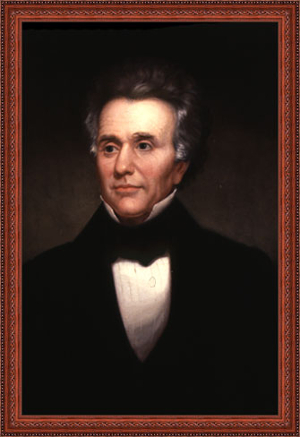1788-1867
Chancellor of New York, 1828-1847
Reuben Hyde Walworth was born on October 26, 1788 in New London County, Connecticut. In 1793, his parents moved the family to Hoosick, New York where he worked on the family farm and was educated in the common school. At 17, he began his legal studies in the law office of a prominent common law attorney, John Russell of Troy, New York. Admitted to the bar in 1809, Walworth moved to Plattsburgh where he established a thriving practice. In 1811, he was appointed a master in chancery.
Walworth’s legal career was interrupted by military service during the War of 1812, and he was acting adjutant general during the September 1814 siege of Plattsburgh. After the war, Major Walworth was appointed division judge advocate, and held the rank of colonel.
Colonel Walworth was elected to Congress with a large majority in 1821. At the expiration of his two-year term, Governor Joseph C. Yates appointed him judge of the New York 4th Circuit, and he held this office for five years. He was known for the prompt and fearless administration of the law in both the civil and criminal branches of his court. It was during this time that Walworth presided in the court of Oyer and Terminer in Plattsburgh over the 1825 trial of Peggy Facto, a woman who was charged with murdering her newborn infant, found guilty, and hanged.
When Samuel Jones, Jr., resigned as Chancellor of New York in 1828, Governor Clinton appointed Reuben Walworth in his place. The following year, Walworth authored Rules and Orders of the New York Court of Chancery (1829), and he was conferred with an honorary LL.D. degree by Princeton University in 1835. Later, he was similarly honored by Yale and Harvard.
As Chancellor, he wrote many important opinions, both in the Court of Chancery and the Court of Errors. Hart v. City of Albany, concerning the use of public waterways, came before him in the Court of Chancery and when his decision was appealed to the Court of Errors, it was affirmed. He was the author of Court of Errors decisions in Livingston v. Mayor of New York (where the issue was the ownership of streets in New York City) and Jack v. Martin, (where he concluded that the federal Fugitive Slave Law of 1793 was invalid). Ruben Walworth served as Chancellor until July 1847, when the court ceased to exist under the provisions of the New York’s 3rd Constitution, adopted in 1846.
Widely respected for his learned opinions, Chancellor Walworth was nominated to the United States Supreme Court by President John Tyler in 1844. When the U. S. Senate failed to act on his confirmation, his name was withdrawn and President Tyler then nominated Samuel Nelson. Walworth ran for Governor of New York in 1848, but was defeated in a three-way race by Hamilton Fish.
Following his defeat in the gubernatorial election, Reuben Walworth retired from public service and moved back to his estate, Pine Grove, in Saratoga Springs, New York. He continued to be involved in legal matters and in 1850, the United States Supreme Court asked Walworth to serve as a special master in the case of Pennsylvania v. Wheeling and Belmont Bridge Company, a patent case involving rail-road spikes. Walworth’s inquiry “became legendary for its duration, complexity and cost.”
Reuben Walworth died at Pine Grove on November 27, 1867.
Sources
Hon. Reuben H. Walworth [notes]
United States Monthly Law Magazine, Vol. 6, Issue 2 (1852), pp. 17-33

